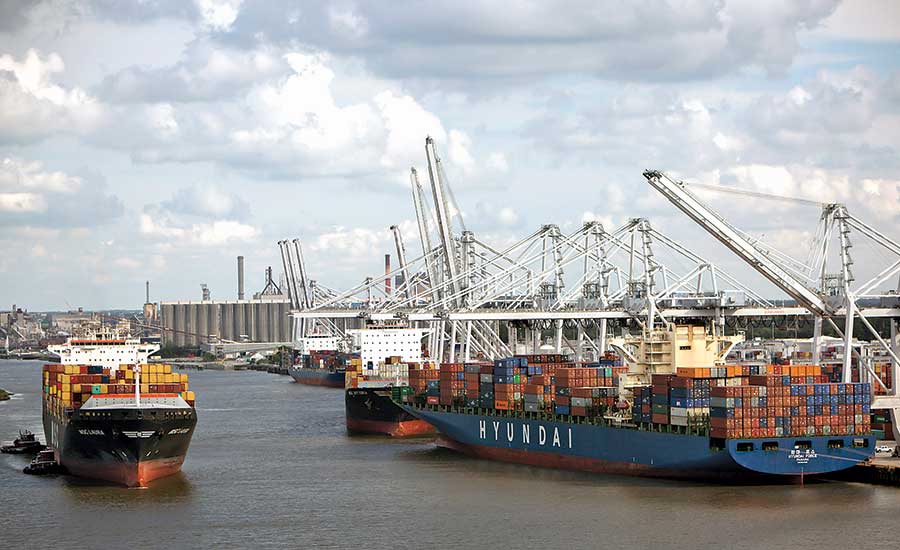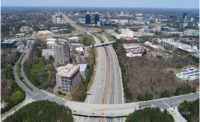The U.S. Dept. of Transportation is revising a $4.5-billion grant program for highway and other freight-related projects. In the plan, announced on June 29, DOT changed some criteria for the grants and, most significantly, is delaying awards for most of the program’s fiscal 2017 funds, for which states and localities applied late last year.
The postponement disappointed applicants, an industry source says. But there is a silver lining. DOT is expected to include hundreds of millions of dollars reserved for the 2017 grants as part of its annual late-summer redistribution to states of unused highway obligation authority.
The grant program was established in the 2015 Fixing America’s Surface Transportation (FAST) Act, which authorized $4.5 billion over five years for “nationally significant freight and highway projects.” The Obama administration dubbed the program FASTLANE, for Fostering Advancements in Shipping and Transportation for the Long-Term Achievement of National Efficiencies. In July 2016, it awarded $759.2 million to 18 projects in the first round of grants.
Interest in FASTLANE was high: DOT received 212 applications, seeking $9.8 billion. Brian Deery, senior director of the Associated General Contractors of America’s highway and transportation division, says, “The competition is really tough, and that just shows you the demand out there.” Under then-Secretary Anthony Foxx, DOT requested applications for 2017 by Dec. 15, 2016.
Now the Trump administration is putting its stamp on the program. DOT Secretary Elaine Chao announced a new name: Infrastructure for Rebuilding America, or INFRA, grants. DOT also tweaked the award criteria. The new “objectives” include “supporting economic vitality, nationally and regionally”; leveraging federal funds to draw non- federal investment; “innovative approaches to improve safety and expedite project delivery”; and accountability for grantees, including having “measurable outcomes.” Chao said, “By ensuring the right incentives, projects selected under this program will be better able to make significant, long-term improvements to America’s transportation infrastructure.”
Joung Lee, American Association of State Highway and Transportation Officials policy director, notes that, given the administration’s infrastructure approach, the criteria aren’t surprising. “The theme is really on leveraging non-federal dollars, using incentives, streamlining the process, encouraging innovation,” he says.
Besides new INFRA grant criteria, DOT said it would award the roughly $70 million available for small 2017 grants—at least $5 million each, the FAST Act says—using applications filed last year. But the program’s large 2017 grants, each at least $25 million, and its large and small 2018 grants will be combined in a single competition. DOT expects to have up to $1.56 billion for that 2017-18 round, for which applications are due Nov. 2. DOT also notes the actual amount depends on what Congress appropriates for the program in 2018. That number won’t be settled until October, at the earliest.
One industry source says that, in general, potential grant seekers were disappointed that all the FY 2017 grants weren’t released. U.S. Senators Dick Durbin and Tammy Duckworth, both Democrats representing Illinois, urged DOT not to put off the 2017 INFRA awards. Deery says applicants had no guarantees of winning when they applied last year. But he adds, “This [delay] will put projects on the back burner.”
The House Transportation and Infrastructure Committee's top Democrat, Peter DeFazio of Oregon, said via email that DOT's "changes distort the intent of Congress, which enacted these grants to fund major, nationally significant infrastructure projects." DeFazio added, "Instead, the new INFRA grants will prioritize projects that are able to rely on private financing and will force states to do more with less money."
(A spokesman for the House committee's Republicans didn't respond to a request for comments on the INFRA grants; nor did aides to the Senate Environment and Public Works Committee's Republican majority and to the Senate panel's ranking Democrat, Tom Carper of Delaware. Those requests were sent during the congressional July 4 break.)
Still, the program’s core is spelled out in the FAST Act and won’t change, officials say. Cathy Connor, director of federal government affairs for engineering firm WSP, says, “There’s only so far afield that … any administration can go because the basic criteria were in the statute.”
The law says the grants can cover no more than 60% of a project’s costs. A project’s federal share is capped at 80% of its overall price tag. At least 25% of the funds must go to projects in rural areas. No more than $500 million of the $4.5- billion total can go for freight-rail, ports or intermodal projects.
Soon, state DOTs are likely to see a benefit from the postponement of the INFRA award date. Lee says the Federal Highway Administration had reserved obligation authority for a 2017 FAST Act grant award round. As with other unused authority, FHWA will parcel out to states perhaps $700 million in unawarded INFRA funds as part of its annual highway funding redistribution.
The 2017 amount, expected in August or September, could be “very large, maybe the largest ever,” Lee says, “It wouldn’t be surprising to see it over $3 billion.”
Story updated on 7/12/17 with comment from Representative DeFazio received on July 11.




Post a comment to this article
Report Abusive Comment